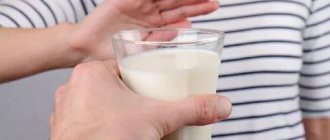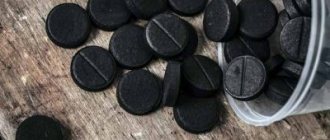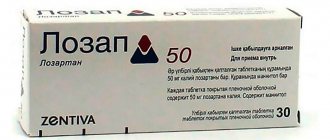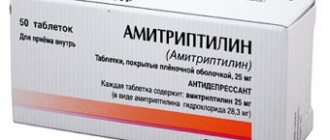What are the benefits of kefir for diarrhea?
Kefir contains a unique set of lactic acid bacteria and fungi that help restore the balance of intestinal microflora. The drink is obtained by adding lactic acid microorganisms to milk - a fermentation reaction occurs. The fat content of kefir depends on the milk that was used in production - whole or skim.
Useful microelements in kefir:
- B vitamins;
- vitamin A;
- carotenoids;
- calcium;
- iron;
- manganese;
- zinc;
- magnesium;
- folic acid;
- fluorine.
Diarrhea develops when the functioning of the intestinal tract is disrupted, causing an accelerated digestion process and a frequent urge to defecate. Loose stools lead to dehydration and leaching of valuable microelements for the body.
Kefir replenishes losses and restores water and electrolyte balance. For diarrhea caused by poisoning, kefir helps cleanse the body of toxins and relieves inflammation from the irritated intestinal mucosa.
Features of fermented milk drink
Kefir cannot be called an ordinary fermented milk product, because it differs from a number of others due to the fungi and bacteria it contains. Positive properties affect the entire human body:
- Vitamins A, D, B2 have a healing effect and prevent the development of peptic ulcers;
- Helps absorb calcium and phosphorus - essential elements for strong bone tissue;
- Vitamin A improves the condition of skin and hair, and prevents deterioration of visual function.
Among the many advantages, this product has a diuretic effect, which in some situations is simply necessary; it is recommended to replace chemical preparations with a similar effect with natural drinks. Regular consumption of fermented milk products inhibits the development of pathogenic bacteria in the intestinal cavity, thus improving the positive microflora. Despite the positive properties, in some situations diarrhea is observed after kefir.
Possible harm of kefir for diarrhea
Moderate consumption of kefir for diarrhea does not have a negative effect on the body. In case of indigestion, daily consumption of the drink should not exceed 400 ml. Harm can only be caused by expired kefir or by consuming the drink if storage conditions are not met. Beneficial lactobacilli die, and pathogenic microflora begins to multiply. Consumption of such a product may lead to poisoning.
Despite all the beneficial properties of kefir, there are still restrictions on introducing a fermented milk drink into the diet for certain diseases. We will consider contraindications for consuming kefir below.
Benefits and harms
Diarrhea may be accompanied by fever and severe malaise. Patients with such symptoms often ask doctors the question: “Can I drink kefir if I have diarrhea?” The recommendations of experts in this regard are clear - fermented milk products are strictly contraindicated in cases of suspected bacterial, viral and protozoal diseases of the gastrointestinal tract. If the patient experiences fever, weakness and vomiting, this may be a sign of an infectious pathology.
Kefir is not recommended for use for chronic diarrhea. Persistent diarrhea may be a sign of colitis or gastritis. And with these diseases, drinking fermented milk drinks is not always allowed.
Kefir can only be beneficial for mild diarrhea caused by poor diet, dysbacteriosis, taking medications or eating poor quality food. In these cases, the product will help restore intestinal microflora and stop diarrhea.
Is it possible to drink kefir if you have diarrhea?
You can drink kefir; it should be excluded from the diet only in the first two days of diarrhea - it will cause fermentation and provoke increased contraction of the intestinal walls, which will lead to an increase in loose stools. If diarrhea intensifies after drinking kefir, it is necessary to exclude it from the diet for a few more days.
Useful properties of kefir:
- Restores microflora in the intestines;
- has a bactericidal effect;
- improves metabolic processes;
- increases the body's immune defense;
- regulates the production of digestive juices;
- restores epithelial cells (lining the mucous membrane in the intestines);
- promotes the absorption of lactose in the small intestine;
- removes toxins from the body.
The body expends the greatest amount of energy digesting heavy foods. When stool is upset, the stomach and intestines cannot fully carry out lipid metabolism (cleavage). Kefir is easily digestible and does not burden the gastrointestinal tract, since it contains a low percentage of fat and is a low-calorie product.
Getting rid of beer diarrhea
When diarrhea occurs, the body loses many useful substances. First of all, liquid, which leads to dehydration. This circumstance is fraught with its consequences. If diarrhea began after drinking beer, the first thing to do is to restore water reserves. It is best to drink mineral water, this will restore the water-salt balance in the body.
After this, take any sorbent. It not only fights diarrhea, but also removes unfavorable substances such as waste and toxins. Often they lead to digestive dysfunction.
When intestinal function is restored, it is necessary to take enveloping agents. Alternatively, it could be jelly or liquid porridge. The stomach lining is still irritated after drinking beer, so soft food will calm it down.
If you see drops of blood in liquid stool, dizziness, nausea or vomiting begin, you should immediately visit a doctor. Most often, these symptoms of beer diarrhea make themselves felt after drinking a low-quality or expired product.
Kefir for the treatment of diarrhea
Over time, kefir changes its properties, and if you have diarrhea, gastroenterologists recommend drinking kefir for three days (strong) - it will help normalize stools. One-day kefir will provoke increased diarrhea, and after 3-4 days the number of beneficial bacteria decreases, and such a drink simply will not bring benefits to the gastrointestinal tract.
Kefir will help with diarrhea only if you follow a gentle diet - this will quickly restore the healthy functioning of the gastrointestinal tract. For medicinal purposes, kefir is consumed no more than two glasses per day - 1 glass is drunk in the morning on an empty stomach and 1 glass before bed. A fermented milk drink will help cope only with mild stool upset caused by indigestion or dysbacteriosis.
Diarrhea can be caused by bacterial infections or helminthic infestations in the intestines, which require medical treatment. Fermented milk drink is included in the diet to remove decay products (toxins) of pathogenic microorganisms.
Important! Kefir does not treat diarrhea; it is used as an aid to normalize intestinal microflora. Only a doctor can determine the cause of stool disorder.
Making a drink at home
Making kefir at home is a fairly simple process. For this, it is best to use store-bought sourdough. However, it is not always possible to find it on sale. Therefore, for home preparation, you can use purchased pure kefir, but do not use a fruit product or with other additives.
To do this, bring whole milk to a boil and let it cool to 36 degrees. For a liter of milk, add 50 grams of store-bought kefir and a spoonful of sugar. Mix thoroughly and pour into a glass jar. Homemade kefir will be ready in 8–10 hours.
It is precisely this fresh drink that will not contribute to the appearance of diarrhea when consumed.
Can children drink kefir if they have diarrhea?
Pediatricians do not prohibit the inclusion of kefir in the diet of children with stool disorders; it is easily digestible and satisfies hunger well due to its milk protein content. If digestive processes are disrupted, kefir helps improve the functioning of the gastrointestinal tract.
Digestive failure in children is often accompanied by loss of appetite; doctors advise giving kefir before bed, it will make you feel hungry in the morning.
At what age can you give kefir to children?
Children are allowed to introduce kefir into their diet from the age of 8 months, by which time the digestive system is fully adapted and secretes enough enzymes to break down food. Infants are given 1 teaspoon of fermented milk drink, as allergies may occur.
Kefir contains a complex protein - casein, which is formed during the curdling of milk. When allergic to this protein, the immune system perceives it as a foreign agent and signals with allergic manifestations (skin rash, rhinitis, diarrhea). If no symptoms occur, then daily consumption is gradually increased to 50 ml.
How much kefir per day can children drink?
Children over the age of one year are allowed to consume kefir in the daily norm - 100 - 150 ml, after 3 years - the norm is the same as for an adult. During diarrhea, the body loses calcium, kefir helps to replenish the losses - 1 glass of fermented milk drink contains 25% of the required daily requirement of the microelement. It is better to give kefir to a child in the evening, since calcium absorption occurs at night.
Many parents are afraid to give kefir to their children because of the ethyl alcohol it contains. The drink actually produces alcohol during the ripening process (up to 0.06%). Pediatricians say that the drink is safe for the child’s health and should not be excluded. Kefir restores immunity after intestinal infections and poisoning. After the acute symptoms subside, the drink is introduced into the menu, as it has a bactericidal effect.
About possible harm
It is strictly forbidden to give kefir to children if storage conditions are violated or if the expiration date has expired. Along with the growth of pathogenic microflora, the fermentation process also intensifies, which leads to an increase in alcohol concentration (up to 3%) - such a drink is dangerous for the child’s body.
Should I add sugar?
Not all children like the sour taste of kefir, and parents often add sugar. If you have diarrhea, you cannot do this - sugar will cause increased gas formation and worsen diarrhea. It is allowed to add fruits or berries containing natural sugars (banana, black currant, raspberry) to kefir.
Stool disorder in children leads to rapid dehydration of the body; you should not self-medicate. A doctor should adjust a child’s diet for diarrhea and select the necessary treatment.
We invite you to read the article How to make delicious and healthy homemade kefir
In what situations can diarrhea occur?
The drink has a unique composition. But it is worth knowing that after cooking, the fermentation process continues in the product. This leads to increased acidity. Therefore, the drink can have different effects on the body.
In what situations does kefir lead to diarrhea?
- expiration date;
- non-compliance with the rules for preparing the product;
- personal intolerance to the components included in the drink;
- increased acidity level;
- the presence of pancreatitis or gastric ulcers;
- use with incompatible products.
After the expiration date in the drink, the acidity level becomes critical. Therefore, if you drink it, chronic diseases of the gastrointestinal tract will worsen. Do not combine the product with meat, fish, marinades and coffee. In addition, the drink should not be drunk while intoxicated. The combination may cause diarrhea and vomiting.
It should be noted that before purchasing kefir, you need to pay attention to the expiration date. If it comes to an end, then it is better to refuse the purchase.
Another common cause of poisoning with fermented milk products is non-compliance with storage rules. It is enough to leave a bottle of drink on the table for a short period of time, and its contents will simply deteriorate. In addition, kefir packaging should not be left open. Any microorganisms that enter such a container can cause spoilage of the product. You can reduce the risk of poisoning by carefully reading the ingredients. Various additives and flavor enhancers can also lead to diarrhea.
What dairy products cause diarrhea?
In addition to kefir, milk and cottage cheese can cause diarrhea. You can determine that the cause of the disease lies precisely in this food as follows. If no more than two hours have passed after consuming them, then the problem lies in fermented milk products.
Who should not drink kefir with diarrhea?
Kefir is a natural probiotic and has a beneficial effect on the intestinal microflora, but there are a number of diseases for which the drink should not be consumed.
Absolute contraindications:
- Acute gastritis - kefir will cause fermentation in the stomach and increase inflammation of the mucous membrane, which will lead to increased bowel movements;
- chronic gastritis in the acute stage;
- pain in the stomach - lactic acid irritates the gastric mucosa and will cause increased pain;
- gastritis with high acidity - kefir causes increased secretion of gastric juice and gas formation;
- erosive gastritis - lactic acid will increase inflammation;
- chronic diarrhea – kefir will provoke an increased urge to defecate;
- severe hypolactasia - kefir will cause new attacks of diarrhea, since the intestines are unable to digest lactose;
- allergic reaction to kefir;
- diarrhea of an infectious nature or caused by helminthic infestation - kefir will cause fermentation in the intestines.
It is allowed to use kefir for chronic gastritis in remission. The daily norm is selected by a gastroenterologist.
Lactose intolerance is not always a limitation for the consumption of fermented milk products. With mild hypolactasia, kefir does not cause increased diarrhea - bacteria convert sugar into lactic acid and promote the absorption of carbohydrates.
We suggest watching the video “Is it possible to drink kefir during diarrhea.”
What is the product
Kefir is a fermented milk product that contains bifidobacteria and milk fungi. This delicious drink contains vitamins A and D, as well as riboflavin.
Vitamin A is necessary for a person to have normal vision; thanks to this substance, hair and skin look healthy and beautiful. With a lack of this vitamin, a person develops photophobia.
Vitamin D promotes the body's absorption of calcium and phosphorus, which are simply necessary for building bone tissue.
If a child does not have enough vitamin D, this risks rickets and other serious diseases of the skeletal system.
The fermented milk drink contains minerals and ascorbic acid, as well as some iron, which is necessary for hematopoiesis. The combination of various minerals and vitamins makes kefir especially useful for both children and adults.
Kefir has a positive effect not only on the microflora of the digestive tract, but also on the entire body as a whole.
Other dairy products for diarrhea and diarrhea
The benefits of fermented milk products for stool disorders are invaluable; in addition to their beneficial effect on digestive processes, they restore electrolyte balance in the body. Fermented foods for diarrhea are allowed in limited quantities and low in fat.
Fermented milk products allow you to quickly restore the healthy functioning of the intestines and eliminate the consequences of a malfunction of the digestive processes. Lacto and bifidobacteria are not destroyed by gastric juice and are a natural component of the intestinal microflora.
Allowed fermented milk products:
Yogurt
Yogurt is a drink made from milk and starter microorganisms that provide a disinfecting effect and suppress anaerobic fermentation in the gastrointestinal tract. Eating yogurt for diarrhea restores metabolic processes, which helps normalize digestion and stool. In case of stool upset, it is recommended to drink a drink with reduced fat content.
Cottage cheese
Cottage cheese is easily digestible and does not cause excessive stress on the gastrointestinal tract, since it does not stimulate the abundant secretion of hydrochloric acid and gastric juice. Cottage cheese is included in the treatment menu for gastrointestinal diseases, helps restore metabolism and reduces the number of urges to defecate during diarrhea. For stool disorders, it is recommended to use low-fat or semi-fat fermented milk products.
Curdled milk
Curdled milk contains high energy value and is a highly digestible fermented milk product. Suppresses the growth of pathogenic microflora and removes toxins;
Hard cheeses
Cheese contains a large amount of protein, micro and macroelements. Affects the digestive glands, stimulating appetite. Nutrients in cheese are absorbed by the body by 99%. Cheese contains a high percentage of fat; adults with diarrhea should consume no more than 50 grams. per day, in children the product is excluded from the diet.
Sour cream and fermented baked milk
Gastroenterologists do not prohibit including a small amount of sour cream (15 grams) and fermented baked milk (50 ml) on the menu for diarrhea in adults.
Fermented milk products contain a large amount of fat and can cause increased diarrhea, so in children and the elderly these products are excluded from the diet. Dietary nutrition for diarrhea involves the complete exclusion of whole milk and cream, both in children and adults.
A bowel disorder is always a dangerous condition for the body, which can lead to serious consequences. If diarrhea persists or your general condition worsens, you should immediately consult a doctor.
You may find these articles useful: Can you drink jelly when you have diarrhea Can you drink coffee when you have diarrhea Can you eat cottage cheese when you have diarrhea and diarrhea Can you eat bananas when you have diarrhea and diarrhea Diarrhea after gallbladder removal
Contraindications
Despite the fact that kefir is very healthy and nutritious, there are a number of contraindications, in the presence of which the use of kefir in food is prohibited.
- Acute forms of chronic gastrointestinal diseases, for example: gastritis, pancreatitis. Kefir is an acidic medium; in case of such diseases, it is necessary to exclude it from the diet, as it provokes an exacerbation and deterioration of the condition. For such diseases, it is better to replace kefir with low-fat, homemade yogurt.
- If a patient has milk protein intolerance, it is better to seek help from pharmaceutical preparations containing lactobacilli and probiotics, which help restore normal microflora in the intestines.
- Children under the age of one year are prohibited from consuming kefir and other fermented milk products, with the exception of those made specifically for children (with the approval of a pediatrician). Children's bodies are not able to digest and absorb the protein casein, which is contained in large quantities in kefir.
- You should not consume kefir if the cause of diarrhea is not determined. Therefore, when the first signs of diarrhea appear, you should immediately seek help from a general practitioner. Only after a diagnosis has been established, the reason that provoked the occurrence of diarrhea, and after the doctor’s approval, kefir can be introduced into the menu.
- If serious infections such as dysentery, salmonellosis, Staphylococcus aureus are detected in the body, you should not take kefir and other fermented milk and dairy products. With such infections, a person is prescribed a strictly limited menu, which he must adhere to.
Despite the fact that kefir is a useful and valuable product for the body, it cannot completely replace treatment. Kefir only helps restore strength and beneficial vitamins that the body loses during the course of the disease. It also helps speed up the healing process.
How to cure diarrhea?
When asking the question: “Is kefir okay for intestinal problems?”, almost everyone will hear the answer - yes! And they immediately begin to drink fermented milk drink without a regimen, in unlimited quantities, and this is the main mistake that can worsen the patient’s condition.
To effectively and quickly restore intestinal function during diarrhea, kefir must be consumed according to the recommendations of specialists:
- Drink the drink only in the presence of non-acute symptoms (without vomiting, with normal body temperature), best on the 2nd day of diarrhea. On the first day of diarrhea, it will irritate the intestinal mucosa, making the situation worse.
- Treatment should be carried out only with fresh, preferably homemade, products that contain a minimum of preservatives.
- You can drink no more than 2 glasses per day of treatment, one in the morning on an empty stomach, the second in the evening. Kefir, drunk in the morning on an empty stomach, improves the digestive system.
- The general complex of treatment should be carried out for no more than 14 days or until symptoms disappear completely.
For treatment to be effective, if you have an upset stomach, it is strictly not recommended to exceed the daily intake of kefir. This can stimulate disturbances and provoke new attacks of diarrhea.
It is worth understanding that this method of getting rid of diarrhea is not a panacea; kefir is a good remedy when it comes to minor ailments and poisoning. When diarrhea is caused by serious disorders, if you only drink kefir, unfortunately, it will not help. Drug treatment is required.
Objectives and principles of nutrition for a sick intestine
Diseases of the gastrointestinal tract occur due to poor nutrition.
Scientists have found that the occurrence of most diseases of the gastrointestinal tract is associated with regular violations of the diet.
Therefore, it is important to adhere to certain norms and rules of nutrition that will help restore the intestines to their previous functions.
When composing a diet for a sick person, it is important to be guided not only by generally accepted standards, but also to take into account the individual needs of the body. With the help of a properly selected diet, you can solve the following problems:
- bring bowel function back to normal;
- stimulate restoration processes in the mucous membranes of the intestines;
- eliminate intolerance to certain dishes;
- replenish the body with missing vitamins and minerals;
- eliminate metabolic disorders;
- normalize the composition of microflora.
For intestinal diseases, diet planning should be based on the following principles:
- nutrition should help treat the disease and prevent further complications;
- nutrition should take into account the individual characteristics of the patient (taste preferences,
- accompanying ailments, digestive features).
Nutrition for intestinal diseases must meet the following rules:
- food should be consumed in small portions 5-6 times a day;
- avoid eating dry food;
- try not to overeat;
- products should be balanced, rich in proteins, fats, carbohydrates and fiber;
- the diet needs to be varied, the body should not lack any elements;
- Products should only be steamed, baked or boiled.
When composing a diet for a person with a diseased intestine, it is important to take into account the effect of foods on intestinal motility. In this way, stool consistency and frequency of bowel movements can be normalized. According to these parameters, products are divided into 3 groups:
- Those that increase motor skills
- Foods that reduce motor skills
- Neutral products (do not affect motor skills)
Recommendations
The fermented milk product has a beneficial effect on the general condition of the body during illness; microelements and “live” bacteria will compensate for the lack of elements in the intestinal microflora, thereby normalizing the balance.
For diarrhea, kefir alone is not enough; together with the use of this drink, you must adhere to the following dietary restrictions:
- Reduce the amount of carbohydrates and fats.
- Exclude citruses, pears, olive and sunflower oils.
- Reduce to a minimum the consumption of foods that can irritate the intestines.
- Divide the amount of food into small portions and increase the number of meals. This will help reduce the load on the intestines, without compromising the body’s receipt of vitamins and energy.
- Take more fluids.
Useful video
Diarrhea or diarrhea is a condition when a person has bowel movements more than 3 times a day, while the excreted feces are not formed and have a liquid consistency. To stop pathologically frequent bowel movements, it is necessary to find out and eliminate the cause that provoked it. One of the most important elements of treating diarrhea is diet and prevention of dehydration.
What can you eat if you have diarrhea, and what foods can make the situation even worse? Correct answers to these questions will help speed up your recovery and return to your normal lifestyle and diet sooner. The duration of the diet is determined by the severity of the person’s condition and the cause of the diarrhea. In most cases, the period during which it is recommended to adhere to a therapeutic diet is 1-3 weeks.











